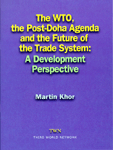|
 The
WTO, the Post-Doha Agenda and the Future of the Trade System: A Development
Perspective The
WTO, the Post-Doha Agenda and the Future of the Trade System: A Development
Perspective
by Martin Khor
Publisher: Third World Network
Year Published: 2002
ISBN: 983-9747-82-7
No. of pages: 54
Price: US$8.00 (inclusive of postage cost by air mail)
Click here for Chinese
version
The World
Trade Organization (WTO) held its fourth Ministerial Conference in Doha
in November 2001 and the decisions made there have resulted in an important
and also heavy Work Programme which will also have very significant implications
for developing countries.
The Doha
decisions and the follow-up have also placed the WTO and the multilateral
trading system at an important crossroads. Important decisions have to
be taken on the shape and nature of the WTO and the trade system.
This
book provides a development perspective of some of the recent developments
and issues arising in the WTO and reviews some key aspects of the post-Doha
Work Programme.
It also
outlines issues and challenges regarding the existing rules and systems
in the WTO, proposes ways of re-orienting the WTO towards a development-centered
approach to trade policy and suggests what should be the mandate of the
WTO and the multilateral trading system.
CONTENTS
1. Introduction
2. Issues
and challenges regarding the present WTO system
(1) Issues of concern to developing countries
(2) Anticipated benefits not realised: Agriculture and textiles
(3) Problems for developing countries when implementing their own obligations
(4) Resolving the imbalances first, or paying again as part of the post-Doha
package?
3. The
post-Doha WTO work programme
(1) Summary of the outcome
(2) The preparatory phase and the Doha process and decisions
(3) The post-Doha work programme:Overview
(4) Implementation issues
(5) Agriculture
(6) Services
(7) Industrial products
(8) Trade and environment
(9) Intellectual property (TRIPS)
(10) The Singapore issues: general
(11) Relationship between trade and investment
(12) Interaction between trade and competition policy
(13) Transparency in government procurement
(14) Trade facilitation
4. Conclusions:
Rethinking trade policy and the multilateral trade system
(1) Rethinking trade policy and the nature and timing of liberalisation
(2) Re-orienting the WTO towards development as the main priority
(3) Reconsidering the introduction of proposed 'new issues' into the WTO
(4) Rethinking the scope of the WTO's mandate and the role of other agencies
(5) Transparency and participation in the WTO system
References
BACK TO
MAIN | ONLINE BOOKSTORE
| HOW TO ORDER

|
 The
WTO, the Post-Doha Agenda and the Future of the Trade System: A Development
Perspective
The
WTO, the Post-Doha Agenda and the Future of the Trade System: A Development
Perspective